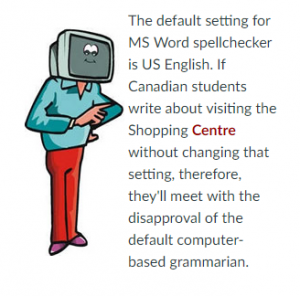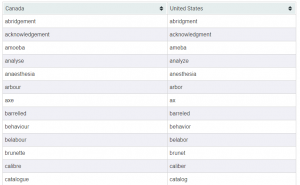
I was reading this and it got me thinking, other than the word colour (color) I really have no idea if something is spelled in Canadian or American English. I think I might be a product of the default setting of US English….. In fact that’s what my computer is set to right now…..guess I have never changed it.
Just for curiosity sake I took a look at spelling differences between US and Canadian words and this is the list I got. Here is what stood out for me. Canadians like “s” over “z”, “u” after “o” and not dropping the letter “e”. (See image below)
This interesting diversion of spelling made me curious. However, I understanding that this might be a huge topic so I made the choice to look at William Caxton, who is credited in Module 4 as “[…] the first English printer, who in a large degree set spelling (Dobson, ETEC540).” Interestingly enough I think Caxton’s spelling was pure economics and appealing to the masses…. I guess that’s not much different than MS Word.
As a translator of books which were to be printed Caxton had to ensure that the language which he used was acceptable to quite a wide group of potential readers and buyers. […] As far as the social position of his language was concerned Caxton’s solution was to strike what he perceived as a balance but he aimed his language not at rude men but at ‘a clerke and a noble gentylman’: ‘Therfor in a meane bytwene bothe I haue reduced and translated this sayd booke in to our englysshe not ouer rude ne curyous but in such termes as shall be vnderstanden by goddys grace’ [therefore, as a compromise, I have translated this book into an English which is neither too coarse nor too refined, but using phrases which are understandable, God willing]. (The British Library, 2004)
William Caxton wrote that in the mid 1400’s and in the 600 plus years since I would say that the English language has evolved a great deal. It’s not surprising that we have US English, Canadian English and one I have not talked about, in British English, and probably a lot more. What is interesting is that as the English language in general evolves through technology to meet the needs of the masses. A quick look at words being added to the dictionary will reinforce that. I wonder how the language divisions will continue to evolve. In 600 years from now will there be Canadian and US English or just English…..or maybe just language. According to Babbel only 20% of the world’s population speaks English currently (Lyons, 2017) So it might not even be English in 600 years……

Partial list from (Quipp, 2009) a full list can be found at Here
References
Dobson, T. (2018, July). Instructor; Ernesto Peña. ETEC540.66A. UBC. Retrieved July 16, 2018 from https://canvas.ubc.ca
Lyons, D. (2017, July 26). How Many People Speak English, And Where Is It Spoken? Retrieved July 16, 2018, from https://www.babbel.com/en/magazine/how-many-people-speak-english-and-where-is-it-spoken/
Quipp, J. (2009, June 24). Canadian / American Spelling Differences … Does Your Blog Speak to the Proper Market? Retrieved July 16, 2018, from https://www.searchenginepeople.com/blog/canadian-american-spelling-differences-does-your-blog-speak-to-the-proper-market.html
The British Library. (2004, July 19). Caxton’s Chaucer – Caxton’s English. Retrieved July 16, 2018, from https://www.bl.uk/treasures/caxton/english.html
Word Count: 537

zarah mathai
July 20, 2018 — 12:55 am
Studying the evolution of language – past, present and future – would be an intriguing line of inquiry, even for high school students. One of the most impactful English lessons I remember from my high school experience introduced etymology and its impact on the interpretation of words. Each student was assigned a word to research, and the word that fell to me was “assassin.” I will note here that I object to the assigning of words to students in favour of providing a word bank as a starting point, thus, allowing students to direct the inquiry. Nevertheless, I was pleased to discover that the word that fell to me was fascinating. The origin of the word assassin historically referred to a “secret order of religious fanatics in the Ismaili branch of the Shiit” (McCarthy 1973). The leader of this group was Sheikh al-Jabal, the “old man of the mountains,” whose name became synonymous with terror among Christian crusaders during this period (McCarthy 1973). As a high school student, this line of inquiry yielded an unforgettable story, and all from a simple, etymological assignment. A colleague of mine who teaches English has spoken of the utility of texts such as Sir Gawain and the Green Knight or Chaucer’s Canterbury Tales as lens to examine the development of the English language. Extending this analysis beyond medieval literature to include literature from various eras could be a means to engage students in an examination of the development of the English language as represented in literature. The extension of this study should also include new media and digital literacies as evidence that language continues to evolve. Thanks for your post!
McCarthy, K. (1973). The Origin of Assassin. American Speech, 48(1/2), 77-83. doi:10.2307/3087895
Kathryn Williams
July 20, 2018 — 3:17 am
Hello!
Thanks for your post; I found it interesting and it also explored some of the ideas I was thinking about while working through the readings for module 4.
As someone who is a self-proclaimed weak speller, I remember being younger and thinking, “Who made up the spelling like this? That’s not how it sounds!” and don’t even get me started on the ‘rules’ that were taught to me when I was in elementary school – with so many instances that break said rules. I was therefore also interested in William Caxton and his role in setting spelling. Your point about translations that appeal to the masses was interesting. I found an article in The Guardian article reviewing the book, Spell It Out by David Crystal. The review is entertaining but also shows that was sensible decisions at the time have led to some confusion in modern day:
“The use of the silent E, for instance, makes very good sense: scribes were trying to find a way of indicating a long preceding vowel sound: that gives us the difference between “run” and “rune”. Approaching from the other direction was a monk named Orrm at the turn of the 13th-century. He suggested doubling consonants up to indicated a preceding short vowel: “hopping” as opposed to “hoping”. When scribes were being paid by the inch, maximalism could be profitable. Why write “run” when you could write “runne”? Kerching!” but also shows that there was sensible decisions at the time have lead to some confusion! (Leith, 2012).
Also, have a read to find out why there is a silent h in the word ghost! I feel like the history of spelling within the English language is one of those topics that I hadn’t really thought about but could now easily find myself down an online rabbit hole for a few hours.
One activity that I like to do during History lessons with my grade 6 class is get students to read a primary source from Tudor times based on this National Archives lesson: https://nationalarchives.gov.uk/documents/education/henryviii.pdf Where we would now have the letter s is usually an f and we all have a laugh at our attempt. We can then find a translated copy of the same document and a modern one. It’s interesting to think how much the English language has changed in the last 600 years. I too wonder where our language will be in 600 years from now – will we all use a series of emojis to convey our thoughts?! In all seriousness, I really don’t know where we will end up.
Thank you
Kathryn
Leith, S. (2012). Spell it out by David crystal – review. The Guardian, Retrieved from http://www.theguardian.com/books/2012/sep/14/spell-it-out-david-crystal-review
marcia kondo
July 26, 2018 — 12:59 pm
What an interesting topic to explore!
I have always prided myself on being an excellent speller. I did my undergraduate degree in English Literature and took some really interesting courses like Shakespeare, Chaucer and Linguistics. What I always found amazing was writing papers on all of these topics were about and written in “English” but really could have been completely different languages. When you read something in Middle English like Chaucer, at first glance you would have no idea what is being written or talked about. Then you might dissect the language of a simple poem using phonetics and it comes out in bits and pieces that also do not resemble English. I taught at English language preschools which was a really fun experience for me. It really opens your eyes to how someone who is not a native English speaker views the language, confuses the language, questions the language and in many cases just does not “get it.” Often, there are no rules to follow, no rhyme or reason why something is spelled or pronounced a certain way and tenses and verb conjugations are even worse. It reminds me of this poem that I have come across several times in teaching:
https://www.readinghorizons.com/blog/post/2013/03/29/the-rules-of-the-english-language-is-there-a-method-to-the-madness
The difference in spelling between Canadian and American English has become very apparent for me, as I grew up in BC and now reside in California. Both my phone and ipad are Canadian and so when I’m typing, often the Canadian spelling is automatic and I find myself correcting to US English so as not to confuse my American friends and co-workers or have to have another conversation about the differences in spelling! It happens when I Google movie theaters/theaters or I’m checking the hours and admission prices of a centre/center. My children will have been born in the US so I wonder if things will get confusing for them or if they will just think my husband and I are crazy. We sometimes even joke around with my mother-in-law who grew up in the countryside in Ontario that she speaks a different kind of English than the rest of us! We have friends from BC who now live in Australia and they have definitely picked up slang and vocabulary that we have never heard before, again yet another type of English! Every language has several dialects but I think English probably has some of the most since it is spoken in so many different countries all over the world. I find myself purposely avoiding using many common words that I wouldn’t think twice about using back home: washroom and toque to name two!
Interesting post. I really enjoyed reading it.
Marcia